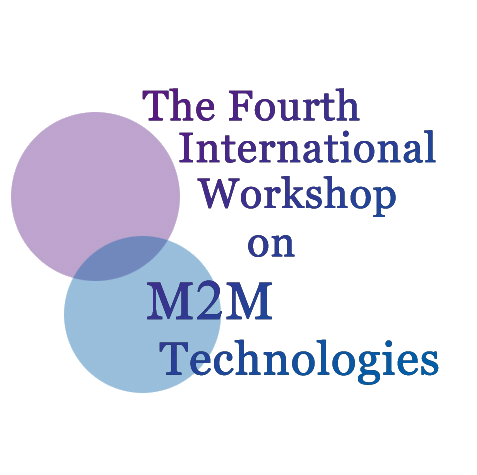Program for 2014 IEEE SPS summer school on IoT and M2M
| Session | Lecturer | Title |
| August 26 (Tuesday), 2014 | ||
| 13:15 - 13:30 | Reception | |
| 13:30 - 14:00 | Hung-Yu Wei | Opening |
| 14:00 - 17:20 | Jianwei Huang | Wireless Network Economics and Games |
| August 27 (Wednesday), 2014 | ||
| 09:00 - 12:20 | Antonio Iera | Convergence of IoT and Social Networks Issues |
| 13:30 - 16:50 | Joseph Teo Chee Ming | Security, Privacy and Trust in IoT and M2M |
| August 28 (Thursday), 2014 | ||
| 09:00 - 12:20 | Mahmoud Daneshmand | IoT/M2M Big Data Analytics: from Static to Streaming data |
| 13:30 - 16:50 | Chee Wei Tan | Optimization and Inference for Cyber Security in Complex Engineered Networks |
| August 29 (Friday), 2014 | ||
| 09:00 - 12:20 | Anna Scaglione | Sensor Networking and Decentralized Signal Processing for Energy Management |
| 13:30 - 16:50 | Yen-Kuang Chen Shao-Yi Chien |
Distributed Video Signal Processing for Internet-of-Things |
| *Each talk includes 20 minutes coffee break. |

|
Afternoon Sesson on August 28 (Thursday), 2014
A Cyber-Physical System for Oil Applications

|
Lecturer: Yen-Kuang Chen IEEE Fellow Associate Director, Intel-NTU Connected Context Computing Center Adjunct Professor, Department of Electrical Engineering, National Taiwan University Prinipal Research Scientist, Intel Corporation |
|

|
Lecturer: Shao-Yi Chien Professor Vice Chairperson, Department of Electrical Engineering, National Taiwan University |
|
|
Abstract: Distributed video cameras will play important roles in various IoT/M2M applications, as video/image cameras can provide rich amount of information. However, there are three challenges. (1) Installation of video camera take a lot of efforts, in particular, it has to be connected to line-power and the network. This is because video sensors cannot transmit its content wirelessly and be low-power enough that we don't need provide extra wires to the camera. (2) Many people are annoyed by the fact that video sensors invade their personal privacies. This is because human readable images are captured, transmitted, and stored. (3) Today, in many system, more video contents are captured than human can possibility handle. This is because many irrelevant video contests are captured. To resolve the problems of high data rate, high power consumption, and large deployment cost of large-scale distributed video sensors, perpetual video cameras, where net energy consumption is almost zero, are required. Many technologies and design challenges are introduced for designing such cameras, such as energy harvesting, distributed video coding, distributed video analysis, and the associated VLSI designs. To bring up these issues and challenges, in this lecture, we will provide (1) an overview of challenges/opportunities in IoT, (2) an introduction to the role and requirements of distributed smart cameras in IoT, (3) the analysis of power consumption of wireless video cameras, (4) an introduction of energy harvesting techniques, and (5) distributed video coding and distributed video analysis, where both the state-of-the-art works and possible future research directions will be shown. |
||
|
Lecturer's short biography: Dr. Yen-Kuang Chen is a Principal Engineer at Intel Corporation, and Associate Director of Intel-NTU Connected Context Computing Center. His research areas span from emerging multimedia applications that can utilize the true potential of internet of things to computer architecture that can embrace emerging applications. He has 40+ US patents, 20+ pending patent applications, and 85+ technical publications. He is one of the key contributors to Supplemental Streaming SIMD Extension 3 and Advanced Vector Extension in Intel microprocessors. He has served as a program committee member of 50+ international conferences on Internet of Things, multimedia, video communication, image processing, VLSI circuits and systems, parallel processing, and software optimization. He is a steering committee member of IEEE Internet of Things Journal, the chair of Internet of Things special interest group of IEEE Signal Processing Society, the Deputy Editor-in-Chief of IEEE Journal on Emerging and Selected Topics in Circuits and Systems. He received his Ph.D. degree from Princeton University and is an IEEE Fellow. Prof. Shao-Yi Chien is the Vice Chairperson in the Department of Electrical Engineering, National Taiwan University (NTU). He received the B.S. and Ph.D. degrees from the Department of Electrical Engineering, National Taiwan University (NTU), Taipei, Taiwan, in 1999 and 2003, respectively. During 2003 to 2004, he was a research staff in Quanta Research Institute, Tao Yuan County, Taiwan. In 2004, he joined the Graduate Institute of Electronics Engineering and Department of Electrical Engineering, National Taiwan University, as an Assistant Professor. Since 2012, he has been a Professor. His research interests include distributed video sensing, intelligent video coding technology, perceptual coding technology, image processing for digital still cameras and display devices, computer graphics, and the associated VLSI and processor architectures. He has published more than 200 papers in these areas. Dr. Chien serves as an Associate Editor for IEEE Transactions on Circuits and Systems for Video Technology, IEEE Transactions on Circuits and Systems I: Regular Papers, and Springer Circuits, Systems and Signal Processing (CSSP). He also served as a Guest Editor for Springer Journal of Signal Processing Systems in 2008. He also serves on the technical program committees of several conferences, such as ISCAS, ICME, SiPS, A-SSCC, and VLSI-DAT. He is the TPC chair of iThings2014/CPSCom2014/GreenCom2014. |
||









